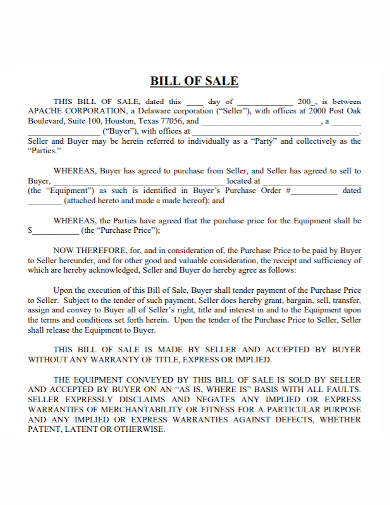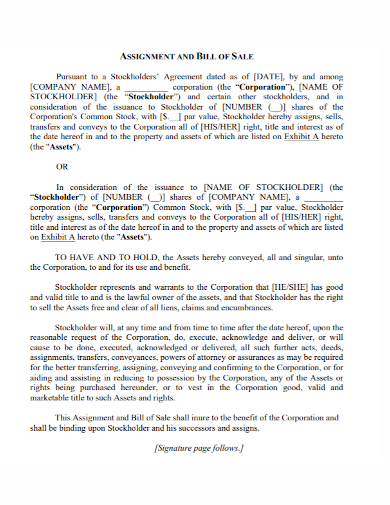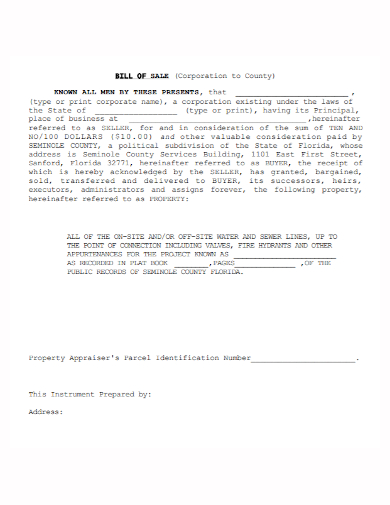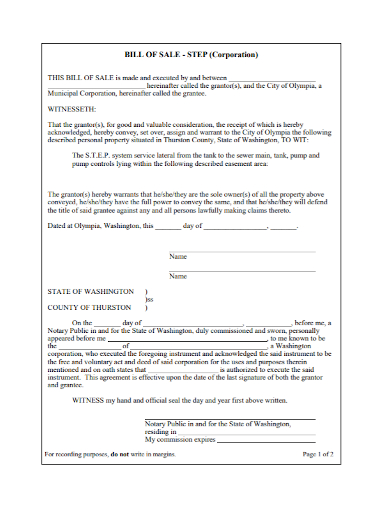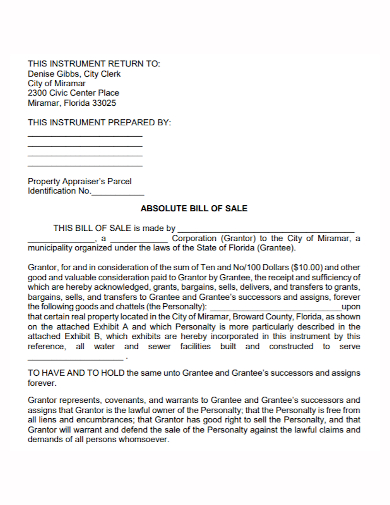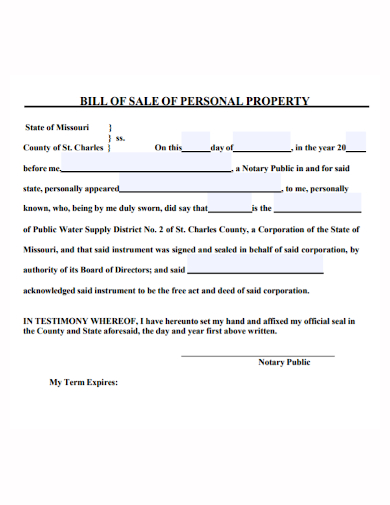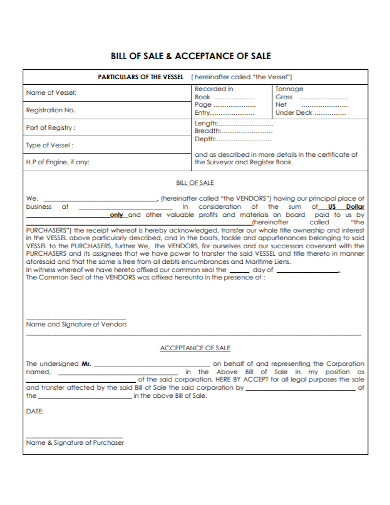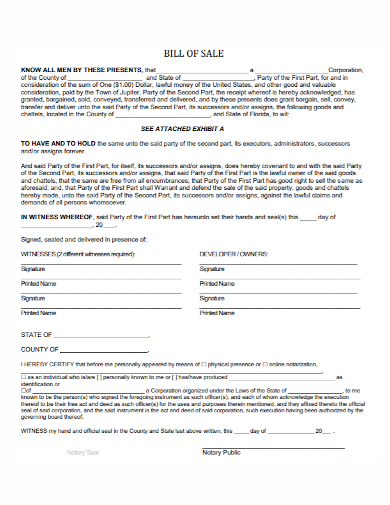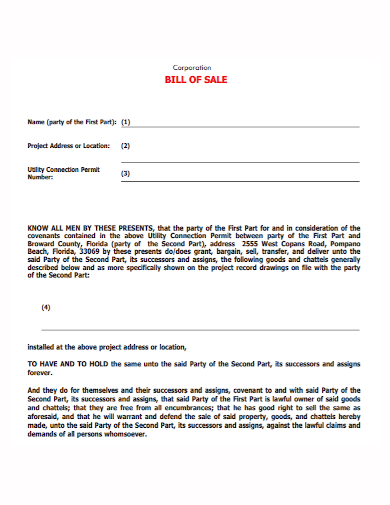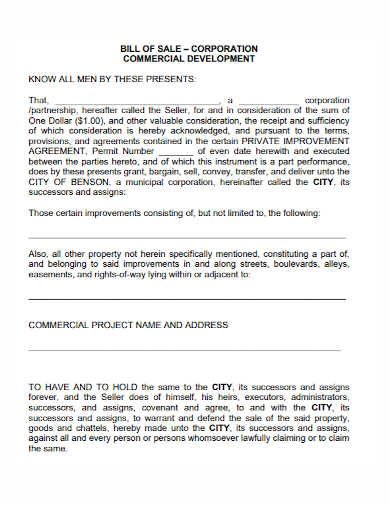A Bill of Sale is a legal document that documents the transfer of ownership of an asset from one person or entity to another in exchange for money. This document is used to complete a wide range of transactions. Automobiles, motorcycles, and airplanes are just a few examples. When a vehicle is bought or sold in the United States, most states require a Bill of Sale as proof of purchase. The Sales Receipt, Proof of Sale, or Sales Slip are all terms that can be used to describe a Bill of Sale. This document is usually written by the seller and contains information about the transaction.
10+ Bill of Sale for Corporations Samples
A Bill of Sale is a legal document that protects both the seller and the buyer of an asset and can be used in the event of a future dispute. It is suggested that both parties keep a copy of the fully executed contract. This serves as payment and purchase proof. This document carries more weight than a standard sale receipt because it includes signatures from both parties involved in the transaction.
1. Bill of Sale for Corporations Template
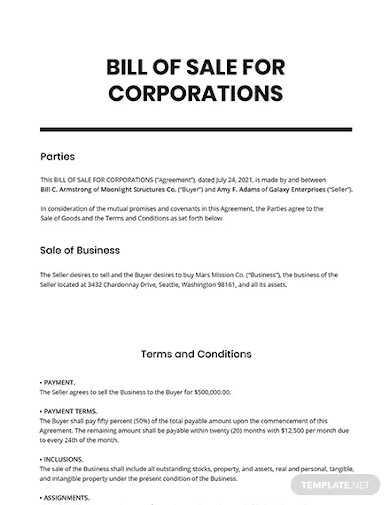
2. Bill of Sale for Corporation
3. Assignment Bill of Sale for Corporation
4. Sample Bill of Sale for Corporation
5. Standard Bill of Sale for Corporation
6. Absolute Bill of Sale for Corporation
7. Personal Property Bill of Sale for Corporations
8. Acceptance and Bill of Sale for Corporations
9. Basic Bill of Sale for Corporations
10. Professional Bill of Sale for Corporations
11. Commercial Development Bill of Sale for Corporations
How to Use a Bill of Sale?
This document can be used to transfer ownership of goods that an entity already owns or physical goods that a business produces. A Bill of Sale can be used by a company for purchases where full payment is made at the time of purchase. Both parties in the transaction usually agree to sell or buy the product “as-is.” The term “as-is” is important because it conveys the condition in which the asset was sold and provides no guarantees or warranties. It is proof that the buyer had no complaints about the product’s condition at the time of purchase. The term “as-is” can protect a seller from a buyer’s request for a refund.
How Does It Work?
Depending on the type of transaction, a bill of sale can be quite complicated or quite simple. A typical retail purchase receipt can be considered a bill of sale because it specifies the specific goods sold to the buyer as well as the price agreed upon and paid for each. For example, when a futures contract expires, the holder is usually given a delivery instrument that functions as a bill of sale and can be exchanged for the underlying asset.
When dealing with assets worth a significant amount of money, such as an automobile, it’s critical to make sure the bill of sale is properly completed and obtained at the time of sale.
A bill of sale usually looks something like this:
- Absolute bills of sale are simply documents evidencing assignments, transfers, and other assurances of personal chattels, and are essentially no more than simple contracts of sale of goods covered by the common law of contract and the sale of goods law.
- Any assignment or transfer of personal chattels to a person as security for the payment of money is referred to as a conditional bill of sale. The conditional bill of sale creates a security interest in favor of the grantee of the bill, giving the grantee a personal right of seizure and possessory security interest.
FAQs
Can a Bill of Sale be used as an acknowledgment for services rendered?
A bill of sale is a document that is used to purchase and sell physical goods. When it comes to services, using documents like an Independent Contractor Agreement or a Service Agreement is a good idea. For all physical good purchases and sales, it is recommended that you use a Bill of Sale. This is due to the fact that this document acts as proof of ownership. For example, if you have machinery in your factory that you want to sell, a Bill of Sale can be used to prove ownership and sale of the asset. If the need arises in the future, using a Bill of Sale could help you defend your rights.
What is an absolute and conditional bill of sale?
A complete property transfer with no restrictions or payments after the sale is described by an absolute bill of sale. If a property is being sold “as is,” this type of document makes sense because the seller has no responsibility once the transaction is completed. When transferring property as security for a loan or if the buyer and seller must meet specific criteria in order to complete the sale, use a conditional bill of sale. The transfer of funds in the case of a loan is contingent on the debtor repaying the loan.
Today, a bill of sale is a commonly written instrument that shows the voluntary transfer of a right, interest, or title to personal property from one person to another, either as security or absolutely, without the property leaving the owner’s physical possession and being delivered to the other party.
Related Posts
Written Warning
Event Program
OMR Sheet
Building Inspection Report
Employment Certificate
Teacher Lesson Plan
Deed of Assignment
Contract Termination Letter
Student Research Proposal
Diet Plan
Housekeeping Resume
Marriage Proposal Letter
Nursing Resume
Fund Transfer Letter
Purchase Order Cancellation Letter

